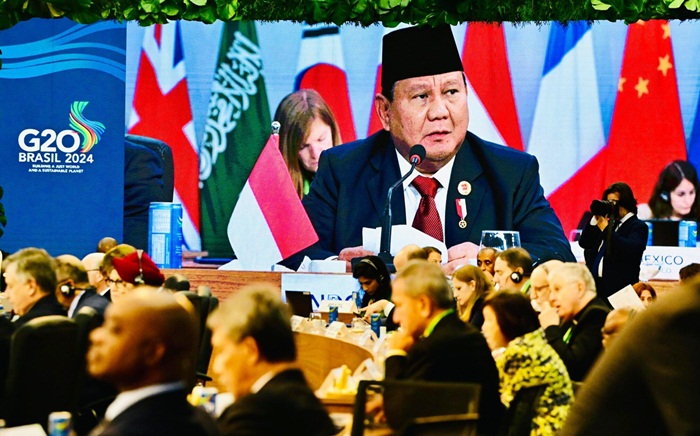Table of Contents
- 0.1 Advancing Global Cooperation on Climate Action
- 0.2 Indonesia’s Green Energy Transition: Ambitious Vision for 2050
- 0.3 Carbon Credits and Indonesia’s Role in Climate Mitigation
- 0.4 Support for Global Health Initiatives
- 0.5 Supporting Delegation
- 0.6 Encouraging Global Collaboration
- 1 What specific measures can Indonesia take to involve local communities in the carbon credit projects, ensuring they receive tangible benefits from environmental initiatives?
Indonesia’s G20 Commitment: A Vision for Sustainable Development and Energy Transition
President Prabowo Subianto of Indonesia made significant strides at the G20 Summit in Brazil on November 19, 2024, advocating for sustainable development and energy transition. During the critical session, he emphasized Indonesia’s unwavering commitment to combat global poverty, hunger, and climate change while simultaneously promoting innovative green energy initiatives aimed at a sustainable future.
Advancing Global Cooperation on Climate Action
During his impactful speech, President Prabowo underscored the urgent need for collective action to meet the United Nations’ Sustainable Development Goals (SDGs). He shared Indonesia’s firsthand experience with climate change, particularly highlighting the alarming rise in sea levels that threaten the coastal areas of North Java. This environmental challenge has devastated hundreds of thousands of hectares of productive land, ultimately exacerbating poverty and food insecurity among vulnerable populations.
Prabowo stated, “For Indonesia, there is no alternative. We are fully committed to taking significant steps to reduce climate temperatures, protect the environment, and address these pressing challenges.” His words resonated with a global audience, calling for unity in the face of a climate crisis.
Indonesia’s Green Energy Transition: Ambitious Vision for 2050
President Prabowo introduced Indonesia’s strategic plan to achieve net-zero emissions by 2050, laying out several key initiatives that represent a robust commitment towards a greener future:
-
Increasing Biodiesel Utilization: Focused on reducing fossil fuel dependency, Indonesia aims to enhance the use of sustainably produced biodiesel across various sectors.
-
Transitioning Steam Power Plants: Prabowo announced plans to convert existing Steam Power Plants (PLTU) to renewable energy sources, reducing reliance on conventional energy methods.
- Expanding Renewable Energy Development: Indonesia plans to develop over 75 gigawatts of renewable energy in the coming 15 years, leveraging the nation’s extensive geothermal resources as a primary energy source.
“We also have tremendous geothermal resources, and we plan to phase out coal-fired power plants and all fossil-fired power plants in the next 15 years,” President Prabowo elaborated, showcasing the government’s comprehensive approach to environmental sustainability.
Carbon Credits and Indonesia’s Role in Climate Mitigation
As one of the keepers of the world’s largest tropical forests, Indonesia plays a pivotal role in the global climate balance. President Prabowo reaffirmed Indonesia’s commitment to capitalizing on its vast carbon storage capacity by offering up to 557 million tons of carbon credits to the international market as part of its climate change mitigation efforts. This commitment positions Indonesia as a significant player in the ongoing global dialogue on climate action.
Support for Global Health Initiatives
In a complementary move, President Prabowo unveiled a USD 30 million pledge to support the World Health Organization (WHO) in addressing funding gaps for international health initiatives. This contribution embodies Indonesia’s broader commitment to global health priorities, illustrating a holistic approach to pressing global challenges.
Supporting Delegation
President Prabowo was joined by a distinguished delegation, including Coordinating Minister for the Economy Airlangga Hartarto, Minister of Foreign Affairs Sugiono, Minister of Finance Sri Mulyani, and Cabinet Secretary Teddy Indra Wijaya. Together, they represent Indonesia’s firm stance on sustainable development and international cooperation.
Encouraging Global Collaboration
The summit witnessed President Prabowo’s assertive leadership in promoting sustainable development and energy transition while highlighting Indonesia’s robust contributions to global health and climate goals. Through his remarks, he illuminated the essential nature of global collaboration in addressing shared challenges and paving the way for a sustainable future.
As the world keeps a close eye on Indonesia’s initiatives, the potential impact resonates well beyond borders—affecting technology industries focused on renewable energy, climate mitigation solutions, and health innovations.
For technology enthusiasts and industry professionals, the outcomes of this summit signify a shift towards a more sustainable, tech-driven future. The integration of advanced technologies in energy production and health initiatives is not merely an aspiration but an urgent necessity.
What do you think about Indonesia’s ambitious plans for sustainability? Share your thoughts and insights in the comments below!
For more information on global efforts in sustainable energy, visit TechCrunch and Wired for the latest updates.
What specific measures can Indonesia take to involve local communities in the carbon credit projects, ensuring they receive tangible benefits from environmental initiatives?
Interview with Dr. Anita Purnomo, Indonesian Environmentalist, and John Smith, Renewable Energy Expert
Dr. Anita Purnomo, Indonesian Environmentalist: Indonesia’s commitment to sustainable development and energy transition is promising, especially with President Prabowo’s ambitious 2050 plans. The focus on sustainable biodiesel, transitioning steam power plants, and expanding renewable energy development shows a clear vision towards a greener future. Moreover, offering carbon credits to the international market could have significant impacts on the global climate balance. However, we should also acknowledge that implementation will be crucial to ensure these plans are effective and beneficial for the environment and society. My question is, how can Indonesia balance economic growth with environmental conservation while achieving its sustainability goals? What challenges do Indonesia currently face in implementing these strategies, and how can they be addressed?
John Smith, Renewable Energy Expert: Balancing economic growth with environmental conservation is not an easy feat, but it is essential to ensure a sustainable future for all. One approach that can be adopted is to invest in green technology and encourage its use in various sectors. This will not only help mitigate climate change but also create new job opportunities and foster innovation. Regarding the challenges faced by Indonesia, financing renewable energy projects can be a significant hurdle, especially in the initial stages. Additionally, infrastructure development and capacity building are critical to ensuring a smooth transition from fossil fuels to renewables. Regarding carbon credits, there might be concerns about double-counting and poor monitoring, which could undermine credibility. Thus, robust systems should be put in place to address these issues.
Dr. Anita Purnomo, Indonesian Environmentalist: You’ve raised valid points. Another challenge is ensuring that the communities living in and around these forest areas benefit from the carbon credits. Lack of transparency and accountability in carbon credit projects can lead to social injustice. What are your thoughts about involving local communities in developing and implementing these strategies?
John Smith, Renewable Energy Expert: It’s crucial to ensure that local communities are effectively engaged in developing and implementing these strategies. Engaging them early on can help identify their needs and concerns


